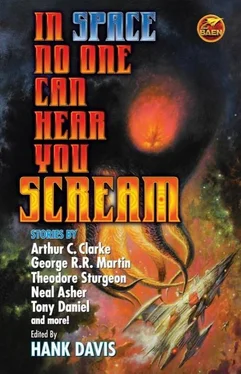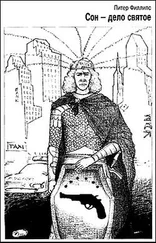Питер Филлипс - In Space No One Can Hear You Scream
Здесь есть возможность читать онлайн «Питер Филлипс - In Space No One Can Hear You Scream» весь текст электронной книги совершенно бесплатно (целиком полную версию без сокращений). В некоторых случаях можно слушать аудио, скачать через торрент в формате fb2 и присутствует краткое содержание. Город: Riverdale, NY, Год выпуска: 2013, ISBN: 2013, Издательство: Baen Books, Жанр: Фантастика и фэнтези, на английском языке. Описание произведения, (предисловие) а так же отзывы посетителей доступны на портале библиотеки ЛибКат.
- Название:In Space No One Can Hear You Scream
- Автор:
- Издательство:Baen Books
- Жанр:
- Год:2013
- Город:Riverdale, NY
- ISBN:978-1-4516-3941-4
- Рейтинг книги:4 / 5. Голосов: 1
-
Избранное:Добавить в избранное
- Отзывы:
-
Ваша оценка:
- 80
- 1
- 2
- 3
- 4
- 5
In Space No One Can Hear You Scream: краткое содержание, описание и аннотация
Предлагаем к чтению аннотацию, описание, краткое содержание или предисловие (зависит от того, что написал сам автор книги «In Space No One Can Hear You Scream»). Если вы не нашли необходимую информацию о книге — напишите в комментариях, мы постараемся отыскать её.
In Space No One Can Hear You Scream — читать онлайн бесплатно полную книгу (весь текст) целиком
Ниже представлен текст книги, разбитый по страницам. Система сохранения места последней прочитанной страницы, позволяет с удобством читать онлайн бесплатно книгу «In Space No One Can Hear You Scream», без необходимости каждый раз заново искать на чём Вы остановились. Поставьте закладку, и сможете в любой момент перейти на страницу, на которой закончили чтение.
Интервал:
Закладка:
Bolting the helmet on, turning on my oxygen, I lurched into the engine room where the steering apparatus was, the place where Jack would be when he was driving us out of the asteroid belt, carefully trying to avoid just this kind of—
Just this kind of disaster. There was a hole on the wall in the engine room. Jack was on the floor, unconscious. I thought he was bleeding but it was hard to tell. It could be true. Or it could be that he’d passed out through lack of oxygen. It was probably pretty low in here, while the air hissed outside the ship.
I groped for the hole. And that’s when I felt it: the tentacle wrapped around my waist, pulling out. There was a claw clamped around my ankle. I saw, through my visor, fearful and intent, a large, slitty yellow eye, something like a malevolent cat, full of fury and vengeance.
The tentacle squeezed. The claw would pierce through the suit. There was a suggestion of teeth, a feeling of things, small, large, hungry, gnawing at the space suit.
I screamed. And then I reached for the emergency lights. As the tentacle dragged me inexorably, my hand fell on the button for the emergency light.
The light would have been turned off in here, of course, while we were underway, to allow Jack to concentrate on the screens that showed the view all around the ship. So he could avoid—
My hand, in its heavy glove, found the button and punched it.
For just a moment there was the feeling of tightening, of harder clawing. Then a shriek like a million damned forced out into the outer darkness.
The outer darkness—
Light coming on must have startled them. I had time to pull away from the tentacle, the claw, the myriad malevolent teeth without mouths that were trying to eat me into a maw of darkness.
And then by rote, without even glancing at Jack, without looking at the things of darkness and cold, insubstantial but real, which filled the engine room, I applied patch and fast-fix-it. I slammed the controls to bring the emergency oxygen into circulation.
I fixed, I cleaned, I made all safe.
I didn’t go to Jack till it was all done, because I had a feeling what I would find. It was as I’d expected. The old miner was dead, on the floor, sprawled like a broken doll, his skin gone the pallor of a landed fish, his eyes wide open and staring at some unimaginable horror.
What I wasn’t expecting, what I wasn’t prepared for, was his wounds: A hundred piercings, a thousand cruel rents where claw and fang had gone in.
I gave him a burial in space, as best I could, and I cleaned the floor of the engine room, and I tried to forget the brief view I had when the lights came on, of tentacle and claw and fang.
I never spoke of it. Won’t speak of it. What good would it do? At best people would think I was playing an hoax on them . . . At worst—
There was enough money, even when I’d split with Jack’s widow, to get me the module to become a navigator.
The bigger ships, the interstellar ones that do commerce with the colonies are well-armored enough. There’s no reason to fear the sort of asteroid strike that was carefully recorded in the log book of the Gone Done It as having caused Jack’s death.
There is nothing to fear. I’m told that our interstellar ships are some of the safest forms of transportation. You stand a better chance of dying on Earth from having an asteroid fall on your head out of a clear blue sky than you stand of dying in one of these.
Deaths happen, of course. Nothing is ever completely safe. We lose a ship or three every few decades. But the causes, though often not explained, simply because the ships can’t be recovered from the immensity of space, are usually obvious and mundane: engine failure, human error and, often presumed, simply landing in a place other than where the ship meant to go. Not hard to do with quantum ships that navigate the n-dimensional folds of an infinite space.
My cabin in the interstellar ship is large, well appointed, bigger than my parents’ house, back on Earth.
It’s impossible that, lying there, snug in my comfortable bed, I can actually hear anything through the thick walls of the ship.
And yet, often and often I wake in the night, my heart pounding and my mouth dry. If anyone heard of these night terrors, they’d invalid me out of the service as unstable, so I tell no one.
But in the deep dark of ship night, while everyone else sleeps, I hear the wings of something large, gross and unnamable circling round and round the ship, just touching. I hear tentacles scraping the outside, searching, trying to find me again, trying to pull me out there, into the dark, the cold.
I hear Jack’s voice say, “They grew bigger out here, more vicious. They wait to take vengeance on those who expelled them from the warm and bountiful Earth.”
My heart pounds, and my palms sweat. My throat closes with terror. How big have they grown? How vicious? Big enough to pierce the skin of an interstellar ship? To devour us all, crew and passengers, suddenly, half-roused from our slumbers and screaming from terror nothing can appease?
Screaming for help that will never come?
Here there be dragons.
Robert Sheckley
The planet obviously had been home to a civilization with a technology advanced far beyond that of Earth, but apparently not much more advanced in other ways, since their records revealed a history of wars. There were no more wars going on now, because all of the inhabitants had disappeared, and those records gave no clue as to what had happened to them. Not that the three humans let the mystery concern them. They were looking for a legendary cache of high-tech weapons more powerful than anything in Earth’s arsenals which they could sell to the highest bidder, and weren’t bothered by that enigmatic disappearance. But they should have been . . .
Robert Sheckley (1928-2005) seemed to explode into print in the early 1950s with stories in nearly every science fiction magazine on the newsstands. Actually, the explosion was bigger than most realized, since he was simultaneously writing even more stories under a number of pseudonyms. His forte was humor, wild and unpredictable, often absurdist, much like the work of Douglas Adams three decades later. His work has been compared to the Marx Brothers by Harlan Ellison®, to Voltaire by both Brian W. Aldiss and J.G. Ballard, and Neil Gaiman has called Sheckley “Probably the best short-story writer during the 50s to the mid-1960s working in any field.” Of course, Robert Sheckley’s ingenious and inventive humor often took very dark turns—as in the story which follows.
THE LAST WEAPON
Robert Sheckley
Edsel was in a murderous mood. He, Parke, and Faxon had spent three weeks in this part of the deadlands, breaking into every mound they came across, not finding anything, and moving on to the next. The swift Martian summer was passing, and each day became a little colder. Each day Edsel’s nerves, uncertain at the best of times, had frayed a little more. Little Faxon was cheerful, dreaming of all the money they would make when they found the weapons, and Parke plodded silently along, apparently made of iron, not saying a word unless he was spoken to.
Bud Edsel had reached his limit. They had broken into another mound, and again there had been no sign of the lost Martian weapons. The watery sun seemed to be glaring at him, and the stars were visible in an impossibly blue sky. The afternoon cold seeped into Edsel’s insulated suit, stiffening his joints, knotting his big muscles.
Quite suddenly, Edsel decided to kill Parke. He had disliked the silent man since they had formed the partnership on Earth. He disliked him even more than he despised Faxon.
Edsel stopped.
Читать дальшеИнтервал:
Закладка:
Похожие книги на «In Space No One Can Hear You Scream»
Представляем Вашему вниманию похожие книги на «In Space No One Can Hear You Scream» списком для выбора. Мы отобрали схожую по названию и смыслу литературу в надежде предоставить читателям больше вариантов отыскать новые, интересные, ещё непрочитанные произведения.
Обсуждение, отзывы о книге «In Space No One Can Hear You Scream» и просто собственные мнения читателей. Оставьте ваши комментарии, напишите, что Вы думаете о произведении, его смысле или главных героях. Укажите что конкретно понравилось, а что нет, и почему Вы так считаете.









